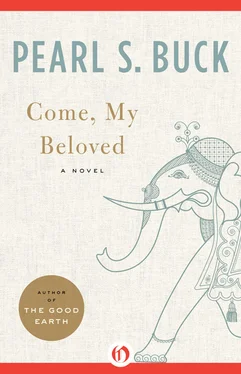Nevertheless Jehar, the Christian sadhu, walking southward, was met by rumor, a seemingly unspoken communication which spread from mouth to ear, village to village, until it was brought to his ears. He heard and hastened to Vhai, knowing what must be going on in the earth-walled house. He arrived there one evening when the sun was setting over green fields. The monsoons were ended, the fields had not yet dried to dust, and the sun fell behind the horizon in clear color as he stood before the gate door of the house.
Ted looked through the open window of his study, aware that someone had passed, and seeing the familiar and well-loved figure he rose and went to the door himself.
“Jehar!” Ted exclaimed. “There is no one whom I had rather see at this moment.”
He put out his hand and clasped Jehar’s large smooth hand, and drew him into the house and thence into the study. There he closed the door and the two stood gazing at each other. Jehar was taller, a mighty figure, his height emphasized by the small, closely wound turban on his head and by the sweeping folds of his saffron robe.
“Sit down,” Ted said. “Are you hungry or thirsty?”
“Neither,” Jehar replied. His voice was deep and peaceful, his great eyes, intensely dark, were mild and affectionate, and his black beard and brows made his olive skin pale but not colorless. His feet were bare. Barefoot he had walked over much of the world, even in the snows of Tibet. He had been to Europe and to England, and at last to America, but everywhere he was the same.
Ted sat down near him and putting his hands on his knees, he continued to look at his old friend. “I had no idea that you were near Vhai.”
“I was not,” Jehar replied. “I have been preaching among the Sikhs. While I was there, word came to me that you were planning to return soon to your own country, and so I came to inquire if it is true and if it is, when you will come back to us.”
“It is true,” Ted said. He hesitated and then suddenly the need to confide his trouble overcame him. There was no one to whom he could speak so freely as he could to Jehar, no one who would understand so well why he felt that Livy must not marry Jatin, even though Jatin was good. So he told Jehar exactly what had happened and why he was taking Livy away quickly.
Jehar listened, nodding his head now and again. “I can see,” he said, “I understand. I could not have understood, perhaps, had I not seen your home. Ted, my brother, I have never told you that I saw your father in New York.”
“My father told me,” Ted replied with some diffidence. His father had written him almost angrily that Jehar had behaved in New York exactly as though he were in India, and while he had made an impression, it was not as a Christian, but as a swami, a fakir, someone strange and even false. “He has not been asked to speak in any of the important pulpits,” his father wrote. “There is something distasteful to the true Christian in this parading of Indian robes, bare feet, and so on. It was distressing to us all.”
“Perhaps he did not tell you that he felt it his duty to rebuke me,” Jehar said with a smile. “I accepted his rebuke for I knew that he must make it, but I went on as I was. I was not a swami, I told him, for that name means ‘Lord,’ and I am no lord. I am only a sadhu, that is, a religious man, and being an Indian I may use that name even though I see God through Jesus Christ.”
“Did my father understand?” Ted asked.
“I do not know how nearly his heart and mind are one,” Jehar replied. He sat thoughtful for a little while, and Ted, accustomed to such silences, waited.
When Jehar spoke, it was not to mention Livy’s name. “You will remember,” he said, “that verse from the Mahabharata which Gandhiji likes so well to quote.”
He paused, drew in his breath, closed his eyes and then began to chant with a deep pulsing rhythm,
“The individual may be sacrificed for the family;
The family may be sacrificed for the sake of the village;
The village may be sacrificed for the sake of the province;
The province may be sacrificed for the sake of the country;
For the sake of conscience, however, sacrifice all.”
He opened his eyes and looked earnestly at Ted, his dark and penetrating gaze seeming to cast an actual physical warmth upon Ted’s flesh, or so Ted imagined.
“What does your conscience say?” Jehar inquired.
“I do not know,” Ted replied. “I have only acted as I felt I must.”
Jehar listened to this, his gaze still affectionately upon his friend. “You have been busy, but when all is done, then you will have time to listen. Each conscience is different from every other, and mine must not speak for yours. What is the conscience? It is the most highly developed part of the human being, the core of the spirit, the most sensitive, the most tender. It is shaped by the mores of a given society, it is developed toward wisdom by individual experience, it is maintained by the strength of the will. Your conscience is different from mine — as mine is different from every other. For me it has been right to live the life of a sadhu in the old Hindu sense, while preaching only Christ. As I told your father, love and home and wealth are wrong for me, while right for others, and I have my rewards. Here in Vhai you have done a great thing, and you have made a renunciation far beyond that of most men of your kind, and you have your rewards as I have mine. Your father cannot understand this, any more than he can understand me. No matter — you have your reward, as I have mine. But now—”
He shook his head, and Ted recognized the old light of ecstasy in the fathomless Indian eyes.
“But now,” Jehar went on, “a new opportunity has come to you. It is not for me to counsel you. The opportunity comes to you from God as all things come to us from God. What does it mean? You may ask yourself, is what you have done not enough? If you feel it is enough, if your conscience says it is enough, then it is enough and you will have your reward. But, if in the quiet of the ship upon the sea, your conscience tells you that what you have done is not enough, that God offers to you the opportunity for more, then listen to your conscience. The ladder to Heaven is made of steps. With each step we think we have reached the goal. But there is another step, and the final one before the gates of God is the one when all of self is given.”
Ted fought the old magic of the dark eyes and the powerful gentle voice. He tried to laugh.
“Jehar, you will never make an Indian of me! I am hopelessly American, though I trust I am as good a Christian as you are.”
Jehar smiled. “Why should I wish to make you what you are not born? It is because you are an American that I delight to call you my brother, and I have seen for myself how much you have renounced in order to be a Christian in India. What I have given up is nothing in comparison to the riches, the pleasures, the honors you might have had in your own country. But you have chosen to live your life here in an Indian village, in an earth-walled house covered with thatch, I am humble before you. You have even brought up your children here, and I have had no children. I do not know what it is to have a child demanded in sacrifice. But what I see, in my humility, is that you have lived so fully the life of a Christian in my country that you are now given the final invitation to accept an Indian for your own son, and his children as your grandchildren. It is possible now for you to take the step of complete brotherhood, in flesh as in the spirit. God has made this possible for you that your life may complete the whole meaning of Christ.”
The very air was trembling with intensity. Jehar’s grave voice quivered, he lifted his magnificent head, he closed his eyes, and went into silent prayer.
Читать дальше












